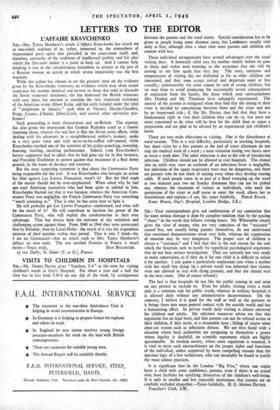Snt,—Your correspondents give sad confirmation of my contention that far
more serious damage is done by complete isolation than by the passing chaos " in the wards that follows visiting hours. ,Mr. Whitcombe simply gives the view of nurses, who are very conscious of the " nuisance " caused but, not usually being parents • themselves do not understand that emotional demonstrations 'mean very little, whereas the suppression of emotion may be very dangerous. The proper care of children is always a " nuisance," and I feel that this is the real reason for the rule which the hospitals seek to justify by superficial psychological arguments that do not bear serious investigation. They are certainly not very ready to make concessions, as if they do it for one child it is difficult to refuse it for another. I can quote a particularly unpleasant case when a mother with her small boy dying (in a private ward) was informed that visitors were not allowed to stay with dying patients, and that she should wait in the next room. (She of course refused.) The fact is that hospitals do not like the public coming in and seize on any pretext to exclude us. Even for adults, visiting twice a week only is a common rule for public wards, whereas in military hospitals it is allowed daily without any administrative inconvenience. On the contrary, I believe it is good for the staff as well as the patients as it brings them into more general contact with the outside world and has a humanising effect. In private wards daily visiting is almost universal for children and adults. My solicitors moreover advise me that this regulation has no legal basis, and that parents can not be refused access to their children, if they insist, at a reasonable hour ; failing of course some clear-cut reason such as infectious disease. We are thus faced with a situation where local authorities are arrogating to themselves a power whose legality is doubtful, on scientific arguments which are highly questionable. In modem society, where some regulation is essential, it is vital to resist such encroachments on the proper rights and functions of the individual, unless supported by more compelling reasons than the specious logic of a few technicians, who can invariably be found to justify the most odious practices.
It is significant that -in the London "Big Five," where one might leave a child with some confidence, parents, even if there is no actual visit, have facilities for satisfying themselves of the children's well-being. It is only in smaller and less reputable institutions that parents are so carefully excluded altogether.—Yours faithfully, H. G. MONRO DAVIES. Traveller's 'Club, S.W.






































 Previous page
Previous page